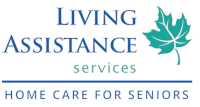Seniors often have a variety of prescription medications to manage throughout the week—a task that can be difficult for anyone and is particularly challenging for those with cognitive impairment. Different prescriptions may be taken once a week, daily or multiple times in a 24 hour period, and there could be specific instructions such as taking a certain pill on a full stomach or avoiding specific foods to avoid unwanted interactions. As the Canadian Institute for Health Information (CIHI) shared, “On average, seniors use more drugs than any other age group in Canada.” In fact, one in four seniors was prescribed 10 or more drugs as of 2021. That figure doesn’t include over-the-counter medications (Tylenol or Aspirin, for example) or vitamins/supplements being taken by the same age group.
Knowing this, it’s easy to see how your aging relatives may make errors in their prescription medication management—after all, it’s a lot to keep track of! Unfortunately, it can also be dangerous. Medication errors can lead to serious health issues, accidental overdose or even death, making these errors incredibly important to prevent. Here are five tips to help seniors manage their medications safely and effectively at home. To learn more or request personalized advice from our team, please contact us. We’d be glad to discuss your needs and provide support.
Keep a detail list of all medications
No matter what age you are, it’s smart to keep a detailed list of your current medications including the dosage, frequency and who it was prescribed by. It may also be helpful to note what each medication is for to avoid mix-ups. You can also list all vitamins, supplements and non-prescription medications taken on a regular basis (antihistamines or painkillers, for example). Update this list on a regular basis and review it with your doctor as needed.
Speak to your pharmacist
Your pharmacist is a wealth of information who should be used as a helpful resource. Consider taking your updated medication list to your pharmacist for review. Ask them to look for potential issues such as inappropriate dosages or potential drug interactions, and follow up on their observations as needed. This is particularly important if multiple doctors have prescribed medication to the same individual. Even if you’re only dealing with one doctor, human error or oversight may occur, and it’s always better to be safe than sorry.
Use a pill sorter or blister packs
Have all of your prescriptions filled by the same pharmacy and ask if they can provide it in blister packs. These well-organized medication packages are broken down by both date and time of day, making it easier to keep track of when medication should be taken (and if a dose was missed). If blister packs are unavailable at your pharmacy, make use of a high quality pill sorter that offers the same function. You can even get digital pill sorters that dispense medication throughout the day with the sound of an alarm!
Set reminders and/or create routines
If you (or your aging loved one) take medication more than once per day, consider setting alarms on a smartphone, smart watch or other device. You can also create routines based on your typical daily schedule and behaviour—for example, placing your morning pills beside the coffee maker or at the breakfast table, and keeping your bedtime pills in the washroom near your toothbrush. Others may find it useful to keep all of their pills in one place and use an alarm system instead of visual reminders. Find out what works best for you and put systems into place as needed.
Get support from your LAS caregiver
While our unregulated caregivers cannot administer medication, they are able to bring it to clients as needed and offer reminders. At the direction and consent of the care recipient, they may assist the care recipient in taking them. For example, your aging loved one’s PSW may bring them their pills along with a glass of water while telling them it’s time for their afternoon medication. They can then make a note that your loved one took their medication successfully and share this information with family members/other caregivers. This type of personalized support is particularly important for seniors with dementia or other symptoms of cognitive impairment, but can be helpful to anyone taking a lot of different medications. For more complex medication needs such as injections, we have registered practical nurses (RPNs) available to help manage symptoms.
Thanks as always for reading—please let us know if you have any questions and feel free to share this post with anyone who may find it helpful. If you would like more information on homecare services in Toronto, contact us. Our team would be glad to provide detailed information and a quote.

